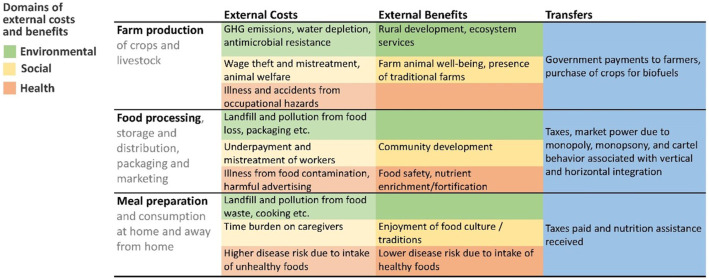A transformation of food systems is needed to achieve the 17 Sustainable Development Goals specified in the 2030 Agenda for Sustainable Development. Recognizing the true costs and benefits of food production and consumption can help guide public policy decisions to effectively transform food systems in support of sustainable healthy diets. Total Cost Accounting (TCA) is increasingly being adopted to evaluate food-related choices complementing market prices with data on nonmarket effects of food system activities. To that end, an expanded framework is proposed in the framework below that addresses the effects of food systems on nutrition and health at each stage of the food supply from farm to household consumption.
A new, expanded framework is presented that allows the quantification of costs and benefits in three domains: health, environmental, and social (see below)

TCA is a tool that could be highly informative and effective for national government decision making in the food sector, building on the longstanding use of cost-benefit analysis (CBA) in other sectors. CBA aims to provide objectivity in assessing implications of proposed projects, programs, and policies, based on the concept that benefits should outweigh costs and that decision makers should prioritize activities with greater benefits relative to their costs In extending CBA to TCA in the food sector, three challenges must be considered and addressed: the nature and extent of available data; the analytical complexity of using TCA as part of decision making; and the implementation of the TCA tool.
You might also be interested in:
Photo Credit:Pexels